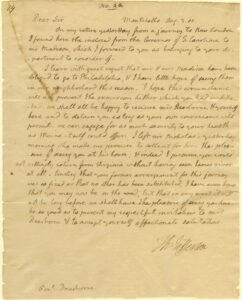
JEFFERSON AS PRESIDENT WRITES TO HIS SECRETARY OF WAR,
HENRY DEARBORN ~~ SAYING THAT THE MADISON’S HAVE DEPARTED TO PHILADELPHIA, BUT HE HOPES THAT THE DEARBORNS WILL VISIT HIM AT MONTICELLO
JEFFERSON, THOMAS. (1743-1826). Third President of the United States; principle author of the Declaration of Independence; and influential Founding Father of the United States. Autograph Letter Signed, “Th. Jefferson”, as President. One full page, quarto. “Monticello”, August 3, 1805. Minor tears archivally repaired, else fine condition. To Henry Dearborn (1751-1829) American military officer and politician, then serving as Secretary of War in Jefferson’s cabinet. Jefferson’s writing style is his usual mixture of small letters, no periods, and infrequent capitalization, [including spelling Dearborn’s last name with an ending ‘e’. He writes:
“Dear Sir, On my return from a day from a journey to New London I found here the inclosed from the Governor of S. Carolina to mr. Madison which I forward to you as belonging to your department to consider of.
I learn with great regret that mr & mrs Madison have been obliged to go to Philadelphia, & I have little hope of seeing them in our neighborhood this season. I hope this circumstance will not prevent the excursion hither which you had meditated. we shall all be happy to recieve mrs Dearborne & yourself here and to detain you as long as your own convenience will permit. we can engage for as much security to your health as Maine itself could offer. I left mr Nicholas’s [Wilson Cary Nicholas (1761-1820) U.S. congressman, U.S. senator, governor of Virginia, and political protégé of Thomas Jefferson] yesterday morning who made me promise to sollicit for him the pleasure of seeing you at his house; & indeed I presume you would not willingly return from Virginia without having seen James river at all. trusting that your former arrangement for this journey was so fixed as that no other has been substituted, I have even hopes that you may now be on the road, but that in any event it will not be long before we shall have the pleasure of seeing you here. be so good as to present my respectful invitations to mrs Dearborne & to accept yourself affectionate salutations. Th: Jefferson.”
Just a fine letter for the presidential collector who wants a letter written as President, that is a cut-above the standard, and with the named associations of Madison, Nicholas, and Dearborn to grace their collection.
$26,500.00
Courtesy Monticello.org website: Wilson Cary Nicholas (1761-1820) was a U.S. congressman, U.S. senator, governor of Virginia, and political protégé of Thomas Jefferson. Born in Williamsburg, he studied at the College of William and Mary until he joined the Continental army during the American Revolution. By 1784 he had joined his mother in Albemarle County and was elected in that year to the House of Delegates, serving until 1789. He befriended James Madison and consulted with Jefferson on the Kentucky Resolutions. Nicholas was elected to the U.S. Senate in 1799 and became a prominent Jeffersonian. He resigned in 1804, but Jefferson asked him to return to Congress. He won a House seat in 1806, serving only one term due to ill health. In 1814, he was elected governor of Virginia and served through the end of the War of 1812. He was a strong supporter of education and helped Jefferson with his plan for the University of Virginia.
Nicholas’s ties to his mentor, Jefferson, continued later in their lives. Jefferson stopped at Nicholas’s house, called Mount Warren, on his trips back and forth to Poplar Forest] His daughter, Jane, married Jefferson’s grandson Thomas Jefferson Randolph in 1815. Nicholas and his brother George were heavy land speculators and as a consequence of the Panic of 1819, he defaulted on a $20,000 note, which had been cosigned by Thomas Jefferson. Jefferson was left with the responsibility for repaying the debt, worsening his own economic situation. Nicholas died the following year and was buried in the Jefferson family graveyard.